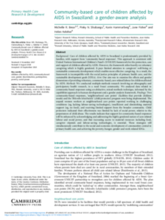Displaying 341 - 350 of 947
This article examines family‐based interventions designed to increase parenting effectiveness, fathers' positive involvement, and couple relationship quality, all with the goal of enhancing children's development.
This book takes readers on a journey that spans three decades and five continents, describing the work of SFAC to keep children in their families and communities or to find safe alternatives where this is not possible.
This meta-analysis synthesized findings from existing evaluations to examine whether and to what extent Family Treatment Drug Courts (FTDCs) participants achieved better reunification and safety outcomes than non-participants.
The aim of this study from Primary Health Care Research & Development was to examine the effects and gender dimensions of providing voluntary, community-based, care-related labour for children affected by AIDS.
The purpose of this paper is to examine the importance of social support for foster parents, in regards to confidence and satisfaction, as well as perceived challenges with fostering.
This article introduces an innovative mentalization-based treatment (MBT) parenting intervention for families where children are at risk of maltreatment.
This article explores casework practices developed for use in child welfare placements that may be successfully applied to New South Wales to help build the practical skills needed to facilitate openness, empathy and respectful interactions between children in permanent care and their birth families.
To illustrate design and implementation of the Strategies for Enhancing Early Developmental Success (SEEDS) Preschool Program, aimed at promoting school readiness in families connected to the child welfare system, the current paper uses parent- and teacher-reported data to summarize the progress of three participating families with diverse histories and presenting issues.
This study aimed to understand the experience of adoptive parents who have completed dyadic developmental psychotherapy (DDP) therapy.
The present study analyzes the opinions of birth families, foster families and social workers responsible for supervising contact visits regarding the benefits and problems associated with contact visits.

